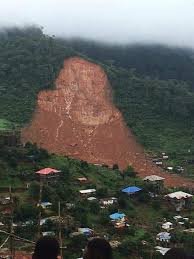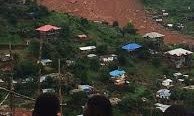By Amb. Elvis S. Fornah
On the quiet dawn of August 14, 2017, Sierra Leone awoke to one of the darkest chapters in its history. Overlooking Freetown, the majestic Sugar Loaf Mountain, once a silent guardian of the city, partially gave way. In mere moments, its slopes turned into a torrent of mud, rock, and debris. The force of nature’s wrath swept through unsuspecting communities, burying homes and lives beneath its weight.
Many residents were still asleep when disaster struck. Entire families were engulfed in the chaos, trapped beneath the rubble of their own houses. Streets became rivers of sludge. Cries for help were swallowed by the roar of the earth’s movement. By the time the flow subsided, the human cost was staggering, thousands displaced, and hundreds of lives lost in an instant.
The August 14 mudslide was more than a natural disaster; it was a harsh reminder of the fragile balance between human settlement and the environment. Overcrowding in Freetown’s hillside areas, deforestation, poor drainage systems, and years of unregulated construction had weakened the land’s ability to hold against extreme weather. That fateful morning, nature’s pressure met man’s neglect, and tragedy was the result.

Eight years on, the memory still stirs grief in the hearts of survivors and the families of those who perished. For many, the scars are not just physical but emotional, loved ones lost, homes destroyed, livelihoods shattered. And yet, for others, the memory has begun to fade, buried under the weight of daily struggles and new crises.
This fading remembrance is dangerous. The lessons of August 14, 2017, are not just historical footnotes, they are warnings written in the earth itself. We must revisit that day, not to reopen wounds, but to ensure they are not repeated. Stronger urban planning, strict environmental protection measures, and proactive disaster risk management must become national priorities.
The resilience of Sierra Leoneans shone in the aftermath, neighbours rescuing neighbours, communities rallying to provide food, shelter, and comfort. International aid and local heroism combined to bring hope in the midst of despair. But resilience alone is not enough. Preparedness, accountability, and sustainable development are the only true safeguards against future calamities.
Let us honor the memory of the victims not only with words, but with action. Let August 14 remain a date etched in our national conscience, a call to protect lives by protecting the land that sustains us.
In remembering the stale of August 14, we are reminded that the cost of inaction is far greater than the effort required to prevent such tragedies. Nature has spoken once; may we never force it to speak again in the same voice.








